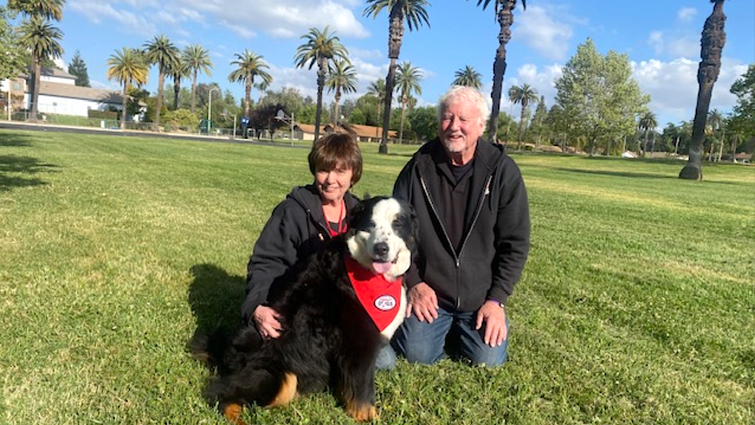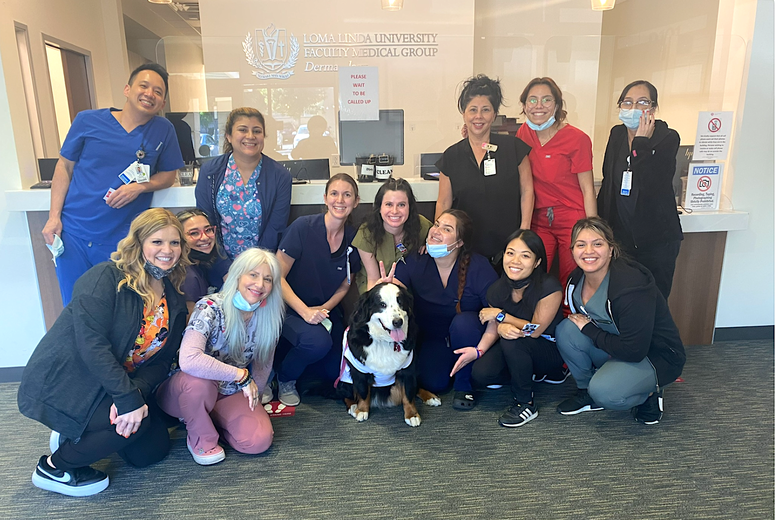

Terry, his wife Vivian, and their therapy dog, Emma
For more than three decades, Terry Crowe, a 74-year-old Southern California native, has battled recurring skin cancer, including non-melanoma basal cell carcinoma and squamous cell carcinoma, and three bouts of melanoma. Since his initial diagnosis 30 years ago, Crowe has undergone nearly every skin cancer procedure available to treat lesions on various parts of his face and body.
As for his care, it wasn’t until Crowe’s wife was diagnosed with stage 3 lung cancer and received treatment at Loma Linda University Health (LLUH) that he decided to transfer his care to the dermatology department at LLUH. The excellent care both he and his wife received for their cancer treatment prompted the couple to give back by volunteering their therapy dog at the children’s hospital.
Since discovering melanoma on his stomach in 1994, Crowe and his wife have remained vigilant in monitoring suspicious moles or growths on his body.
“After the first one, you’re always cautious,” said Crowe, who credits his wife with identifying the cancer in the first place. “If we notice a mole that seems to be growing quickly, I inform the doctors, they examine it, and if it looks concerning, they usually perform a biopsy.”
But for Crowe, receiving the necessary care hasn’t always been easy. After feeling neglected by a previous provider, he knew he needed more comprehensive care to maintain his recurring skin cancer. The decision to transfer to LLUH came after witnessing the exceptional care his wife received while battling lung cancer.
“We were spending all our time at Loma Linda hospital, so I decided to switch my dermatology care over to them,” Crowe said. “I’m glad I did because they’ve taken excellent care of me.”
Since transferring his care, Crowe has undergone a variety of procedures, ranging from quick excisions to more involved procedures, particularly for areas like the head, neck, hands, and feet.
“A lot of his visits were all-day procedures taking care of the skin cancers,” said Ashley Elsensohn, a surgical dermatologist at LLU. “Mohs surgery has been crucial for him. It’s a tissue-sparing procedure that removes cancer layer by layer while preserving healthy skin, which is a must for delicate areas.”
As a way to give back for the care both Crowe and his wife received, the couple began volunteering their therapy dog, Emma, to spend every Thursday at the children’s hospital.
“If it weren’t for the lung cancer, we would never have volunteered to share our dog with the children,” Crowe said. “Our dog, Emma, spent every Thursday with the kids –– over 630 hours before she retired. We would also go to oncology to visit all the nurses that treated my wife during her chemo and cancer treatments.”
Crowe also made sure to bring Emma to visit the dermatology department, something the entire team started looking forward to. While people with Crowe’s condition can often experience medical fatigue from numerous procedures, his positive outlook underscores the importance of a strong patient-doctor relationship.
“He treats us as much as we treat him,” Elsensohn said. “His positive attitude and Emma’s visits brighten our days just as much as we try to brighten his.”
While skin cancer is often not life-threatening when detected early, consistent care remains essential in preventing complications such as pain, bleeding, or disfigurement. Elsensohn also notes that melanoma commonly develops in areas with minimal sun exposure, such as the back in men and the upper arms or legs in women. However, non-melanoma skin cancers typically occur in sun-exposed areas. For optimal protection, wide-brimmed hats, sunscreen with SPF 50 or higher, and seeking shade remain the most effective ways to safeguard the skin from sun damage.
As awareness of skin cancer prevention grows, Crowe serves as a reminder of the importance of early detection.
"If people feel like something isn’t right, they need to get it checked out,” Crowe remarked about the dangers of skin cancer. “If they notice something getting bigger and bigger, don't wait to get it checked out.”
Loma Linda’s dermatologic surgeons are leaders in treating complex surgical skin conditions such as melanoma, non-melanoma skin cancers, lipomas, and cysts. If you need specialty care for skin cancer or complex skin conditions, call 909-558-2890 or click here for more information.


